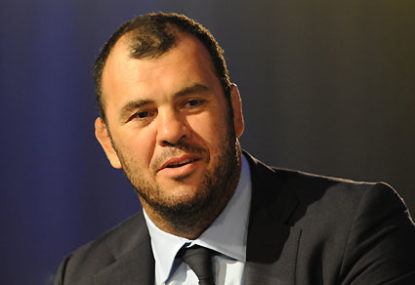Rod Macqueen, Alan Jones and Bobby Dwyer are the three most successful Wallaby coaches over the last 40 years.
Michael Cheika will join them.
A big call? Not on your life. Cheika has all the attributes, the hunger and the communication skills to be a stunningly successful Wallaby coach.
Macqueen, Jones and Dwyer had similar qualifications on their watch.
Macqueen’s win-rate was 79.1 per cent with 34 wins from 43 Tests between 1997 and 2001, that included the 1999 Rugby World Cup, the 2000 Tri-Nations, the Bledisloe Cup in 1998, 1999 and 2000, and the historic 2-1 series win over the British and Irish Lions in 2001.
A full house that makes Rod Macqueen the gold medal Wallaby coach.
Jones wasn’t far behind, with his beginnings in the last years of amateurism. His win rate was 76.67 per cent with 23 wins from 30 Tests between 1984 and 1987.
In 1984 his Wallabies won the only Grand Slam by the men in gold in history by beating England, Wales, Ireland and Scotland, with Mark Ella setting an individual record of scoring a try in each one of the four Tests.
In 1986 the Wallabies, under Jones, regained the Bledisloe Cup on New Zealand soil for the first time in 39 years. By 1987 Jones was well-entrenched at 2UE on his way to radio stardom, that cost the Wallabies the inaugural Rugby World Cup in 1987, and Jones his Wallaby job.
Dwyer book-ended Jones’ Wallaby coaching career from 1982-83 and from 1988-95.
His win-ratio overall was 63.89 per cent with 46 wins from 72 Tests, that included the 1991 Rugby World Cup and the 1980 Bledisloe.
Cheika’s win ratio is only 25 per cent with a win over Wales, but losses to France, Ireland and England. Despite such a lowly and stuttering start, he will join Rod Macqueen, Alan Jones and Bobby Dwyer at the top of the Wallaby coaching tree, once he sorts out the problems he inherited.
1. Lack of discipline
It never ceases to amaze that 23 Wallabies are selected for every Test, and far more than half can’t pass properly or accurately, some like Adam Ashley-Cooper hardly pass at all and far too many others have regular butter fingers.
And that’s the best part of the team – the attack.
In defence, the number of first-time tackles that are missed has become endemic, and by the time an opponent is tackled to ground, they have made an extra 10-20 metres. Add those missed tackles up over 80 minutes, and the Wallabies are gifting the opposition too much territory.
Penalties are the bane of the Wallabies, too, ranging from bone-headed to unlucky.
The bone-headed are inexcusable – not releasing, coming in from the side and wandering offside but not making any genuine attempt to get back on-side. The unlucky penalties happen to every side, depending on the ability of the referee.
But when a side like the Wallabies give away bone-headed penalties, referees will watch more closely, and they will find a bulldust penalty – that’s the nature of the beast.
2. Scrummaging
We have all been watching crap Wallaby scrummaging since the Wallabies beat the Lions in 2001 – that’s 14 years of crap.
I don’t know how Andrew Blades keeps his job as set-piece coach, when the lineouts aren’t that crash-hot either.
Cheika will look forward to the return from long-term injury of tireless hooker Stephen Moore, his Kamikaze offsider Tatafu Polota-Nau, Scott Fardy, Hugh Pyle, Wycliff Palu, David Dennis, Scott Higginbotham, Hugh McMeniman and especially David Pocock among the forwards.
And Will Genia with Quade Cooper to start playing full 80-minute rugby for the Reds to get back into form. The Wallabies, and Cheika, need their on-field input as they will need James O’Connor, and new recruit Karmichael Hunt.
There are many pluses awaiting Michael Cheika over the next few months before the Wallabies get stuck into the restricted Rugby Championship and Bledisloe Cup.
The first is July 18 against the Boks at Suncorp. Then July 25 against the Pumas away followed by August 8 against the All Blacks in Sydney.
And August 15 for the return clash against the All Blacks at Eden Park where the Wallabies have lost their last 15 Tests since the Andy Slack-Alan Jones combination were successful in 1986.
And that’s virtually where we came in.





























































































